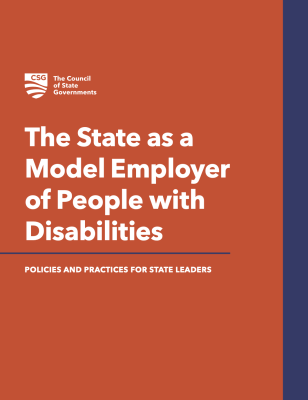STATE AS A MODEL EMPLOYER
State government plays an important role in advancing the recruitment, hiring, retention and advancement of people with disabilities through their own employment policies. Work Matters: A Framework for States on Workforce Development for People with Disabilities highlights the strategies that many states are adopting in their quest to become model employers of people with disabilities.
The State as a Model Employer of People with Disabilities: Policies and Practices for State Leaders
As state governments increasingly recognize the advantages of proactively recruiting and hiring people with disabilities, many are pursuing “state as a model employer” (SAME) policies and practices. The State as a Model Employer of People with Disabilities: Policies and Practices for State Leaders offers public officials policy options as well as real-life examples of innovative policies and programs that states have successfully implemented to build a stronger, more inclusive public-sector workforce.
State Policies Relevant to STATE AS A MODEL EMPLOYER
Click on the map above to see the corresponding policies.
ALTERNATE VIEW OF State Policies Relevant to STATE AS A MODEL EMPLOYER
Lesson 3 identifies several examples of State as a Model Employer (SAME) policies adopted by state policymakers and included in the Work Matters Report (2016). All of the policies, including those adopted since the publication of the Work Matters report, are included in the map at the top of this lesson. Finally, this lesson includes links to resources that provide additional information to enable policymakers to make informed decisions about becoming a model employer of people with disabilities.
To become a model employer of persons with disabilities, state policymakers may want to consider the adoption of the following policy options:
- Formal mechanisms (legislation, executive orders)
- Infrastructure (cabinet positions, task forces, working groups, advisory committees)
- Comprehensive government-wide strategic plans
- Diversity and inclusion initiatives (affirmative action)
- Fast-track and other hiring systems to facilitate employment
- Advancement and retention policies and procedures (centralized accommodation program, telework and stay-at-work and return-to-work policies)
- Accessibility of websites, online systems, mobile apps and other forms of information and communication technology
- Personal assistance services
- Training of personnel
1. FORMAL MECHANISMS TO ENACT POLICIES COMMITTING STATES TO BE MODEL EMPLOYERS OF PEOPLE WITH DISABILITIES.
State policymakers may want to consider adopting formal mechanisms (such as executive orders and/or legislation) committing states to be model employers of people with disabilities. Learn More in the Work Matters Framework.
Executive Orders
Legislation
Both Executive Orders & Legislation
Executive Orders:
Both Executive Orders and Legislation:
- Alaska (EO. 104 & Article 1 39.25.150)
- California (EO. S-4-05 & AB 925)
- Delaware (EO. 30 & L. 5904A)
- Maine (EO. 2 & LD No.1910)
- Minnesota (EO. 14-14 & 43A.19)
- New York (EO. 6 & S55-C)
- Washington (EO.13-2 & HB1636)
2. INFRASTRUCTURES
State policymakers may want to consider creating infrastructures to ensure that issues affecting people with disabilities are addressed by government agencies at the earliest stages of policy development, design, implementation and evaluation. States have used a variety of strategies to achieve this end, including cabinet-level positions, interagency working groups and advisory committees. Learn More in the Work Matters Framework.
Cabinet-Level Position
State policymakers may want to consider creating a cabinet-level position to act as a champion for people with disabilities. For example, in Maryland, there is a cabinet-level position tasked with designing, implementing, and evaluating policy relating to people with disabilities. The secretary of disabilities, as head of the Maryland Department of Disabilities, sits on numerous advisory councils and task forces related to disability issues. The department also provides information and referrals to Maryland citizens with disabilities, evaluates relevant state programs and at least quarterly consults with and advises the Maryland Commission on Disability.
Interagency Task Forces, Working Groups, and Advisory Committees
State policymakers may want to consider creating task forces, interagency workgroups or advisory committees to reinforce and assess efforts. Alaska, California, Connecticut, Illinois, Louisiana, Massachusetts, New Mexico, Pennsylvania, South Dakota, Utah, Kentucky and Washington have committees, interagency working groups and/or task forces addressing policy issues relating to people with disabilities.

For example, in Washington, Gov. Jay Inslee issued an executive order directing the Office of Financial Management to convene a task force for the purpose of assisting state agencies with recruitment and retention of persons with disabilities.
The task force is to provide:
- Recommendations on how to achieve the employment targets established in the executive order; and
- Guidance and other support to agencies and institutions of higher education on recruitment, retention, accommodation, and accessibility for people with disabilities.
The task force must also engage model private-sector companies to share strategies, exchange best practices and provide technical assistance to boost the employment of people with disabilities in all sectors.

The Illinois General Assembly in 2017 enacted HB 2782, which created the Employment and Economic Opportunity for Persons with Disabilities Task Force and authorized the Task Force to administer the state Employment First initiatives and analyzing programs and policies of the state to determine what changes may be necessary to remove barriers to competitive employment and economic opportunity for persons with disabilities.

In 2018, Louisiana Gov. John Bel Edwards issued Executive Order JBE 18-08: State as a Model Employer. The EO establishes the State as a Model Employer Task Force.
3. STRATEGIC PLANS
State policymakers may want to consider adopting comprehensive government-wide strategic plans (e.g., state as model employer) that include reporting to leadership on a regular basis. Alaska, California, Florida, Louisiana, Ohio and Massachusetts have adopted policies supporting the development of strategic plans for state employment of people with disabilities. Learn More in the Work Matters Framework.

For example, California Government Code 12803.6 requires the Labor and Workforce Development and Health and Human Services agencies to coordinate in developing a comprehensive strategy to meet the employment needs of individuals with disabilities, including ensuring that California is a model employer. Section 12803.65 of the California Government Code requires the Governor’s Committee on Employing People with Disabilities to perform a consulting and advisory role in the development of this comprehensive strategy on disability employment.

The Massachusetts strategic plan is entirely devoted to implementing state-as-model-employer policy. Elements of the plan include, but are not limited to: increased recruitment efforts, expanded state agency internship opportunities, streamlined reasonable accommodation processes, use of universal design principles in the workplace and disability awareness training for state personnel.

In 2019, Gov. Mike DeWine of Ohio issued Executive Order 2019-03D directing all state agencies to collect and evaluate self-disclosed data through the state personnel system to be used to measure progress in hiring people with disabilities. This data will be used to develop a strategic plan.
4. DIVERSITY AND INCLUSION (AFFIRMATIVE ACTION)
State policymakers may want to consider extending diversity and inclusion initiatives (e.g., affirmative action) applicable to state agencies and departments. These efforts may include the adoption of hiring goals and preferences; development of employee self-identification policies; and the implementation of annual reporting mechanisms and surveys. Learn More in the Work Matters Framework.
Hiring Goals and Affirmative Action Plans
Connecticut, Illinois, Iowa, Louisiana, Massachusetts, Minnesota, Missouri, New Jersey, Oregon, Vermont, Virginia and Washington have adopted hiring goals for people with disabilities.

For example, Connecticut Public Act No 13-225 specifies that all departments and agencies of state government are mandated to establish, as part of their affirmative action plans, specific annual goals and timetables on (1) the number of jobs that are to be filled through the accommodation of persons with disabilities, and (2) entry-level training for such persons. In addition, under the supervision of the commissioner of administrative services, each department and agency of state government must establish an effective program of accommodation and entry-level training of persons with disabilities. Under the law, such programs must be part of required departmental and agency affirmative action programs. All departments and agencies also are required make a range of training opportunities available to such persons.

Illinois requires that state agencies’ affirmative action plans must include a numerical hiring goal for the employment of qualified persons with disabilities in the agency based on the proportion of people with work disabilities in the Illinois labor force and a detailed status report indicating, by each position in state service, the number, percentage and average salary of individuals employed by, among other things, disability.

Washington Gov. Jay Inslee, recognizing that state government is one of the largest employers in the state, issued an executive order setting the goal that by June 30, 2017, 5% of the state’s workforce will be people with disabilities. Under the order, each cabinet-level agency must develop an annual employment plan to address the underrepresentation of people with disabilities in their agency and report progress.
Surveys, Studies, Reporting Mechanisms and Data Collection
A number of states use surveys and reporting mechanisms to measure progress. Illinois, Florida, Kansas, Maine, Massachusetts, Missouri, Minnesota, Ohio, Texas and Washington have surveys and/or reporting mechanisms in place.

The Alaska Governor’s Council on Disabilities and Special Education conducted a survey of state workers in 2011 in order to continue to monitor the representation of employees with disabilities in Alaska state government and solicit recommendations for improvement. Survey findings revealed important information on the state’s efforts related to increasing the employment of persons with disabilities, including that they are in fact appropriately represented in the state’s workforce. Recommendations offered by the council include: increasing training on the ADA for managers and supervisors, increasing flexibility through variable work schedules and job-sharing opportunities, improving workplace accessibility, developing targeted recruitment and retention programs for individuals with disabilities, and offering health and wellness benefits and programs.

Illinois’ departments of Human Rights, Human Services and Central Management Services, and the Interagency Committee on Employees with Disabilities and other state agencies conduct an ongoing online work disability survey. The purpose of the survey is to give employees with disabilities an opportunity to self-identify and determine for whom emergency evacuation assistance may be necessary.

Washington enacted House Bill 1636 in 2015, requiring all state agencies with 100 or more employees to provide an annual report to the legislature with data related to the percentage of individuals with disabilities in the agency’s workforce, including the number of new hires employed from the Division of Vocational Rehabilitation services or the Department of Services for the Blind. The legislation also requires that each covered agency report to the legislature regarding opportunities for internships that would lead to permanent placement in entry-level positions.

In 2019, Gov. Michael Parsons of Missouri issued Executive Order 19-16 directing the Office of Administration, on an annual basis, collect data, based on voluntary self-disclosure and report initial baseline numbers of state employees with disabilities and report and evaluate the state’s progress in increasing the percentage of employees with disabilities in the state workforce.
5. FAST-TRACK HIRING SYSTEMS
Systemic steps can be taken to increase the accessibility of application processes for people with disabilities. For example, state policymakers may want to consider:
- Adopting special appointment lists for noncompetitive employment
- Institutionalizing hiring preferences, trial work periods, and paid internships
- Conducting mandatory interviews of qualified candidates
- Making modifications to civil service exams to accommodate disabilities
- Offering expedited certification processes
Learn More in the Work Matters Framework.
Special Appointment Lists, Trial Work Periods and Paid Internships.
State policymakers may consider authorizing the maintenance of special appointment lists for noncompetitive appointment. State policymakers may also want to consider offering trial work periods and/or paid internships.
Note: The Federal Government has established the “Schedule A Excepted Service Hiring Authority for Individuals with Disabilities.” Schedule A is a hiring authority for federal agencies to use to tap into a diverse and vibrant talent pool without going through the often lengthy traditional hiring process. Schedule A allows individuals to apply for a federal appointment through a noncompetitive hiring process. This means that if an individual meets the eligibility status of the appointment and the minimum qualifications for a position, the individual may be hired for the position without competing with the general public.
Note further: The federal government has established the Workforce Recruitment Program for college students with disabilities as a potential model of paid internships.
Several states have established excepted service hiring authorities and maintain special appointment lists for noncompetitive appointments. States also authorize trial work periods and paid internships. Alaska, Delaware, Illinois, Maine, Maryland, Utah, Florida, Illinois, Utah, Minnesota and Nevada have all adopted hiring strategies that allow individuals the opportunity for noncompetitive assignments.

Delaware established a Selective Placement Program through legislation and state policy. The program provides hiring managers with direct access to place qualified candidates with disabilities into vacant positions, bypassing some of the complicated and time-consuming processes. The Division of Vocational Rehabilitation (DVR) or the Division for the Visually Impaired (DVI) certifies the applicant as a person with a disability. In addition, a modest number of positions are dedicated to people with disabilities throughout the state, enabling agencies to provide paid training and work opportunities for applicants seeking the experience and learning that comes with employment. Some of these are short term, limited to a year, while others are longer term and enable a person with a disability to attach to individual state agencies.

Maryland’s Special Options Eligible List fast track program provides individuals with disabilities the opportunity to engage in training programs with the Division of Rehabilitation Services (DORS) or an internship under Maryland’s QUEST program, administered jointly through the Department of Budget and Management and DORS.

Utah established the Alternative State Application Process (ASAP) for individuals with disabilities in 2010 through House Bill 17, under which qualified candidates with disabilities may be appointed to fill vacant positions for a six-month trial examination period. Upon completion of the examination period, the worker would then be in the position during the state’s customary probation period.

In 2016, Florida enacted FL HB7003, which implements programs that incorporate internships, mentoring, on-the-job training, unpaid work experience, situational assessments and other innovative strategies that are specifically geared toward individuals with disabilities.
Hiring Preferences
State policymakers may want to consider adopting hiring preferences for qualified people with disabilities. Arizona, Kansas, Nevada, Montana, South Dakota, Wisconsin and Wyoming have passed hiring preference policies for people with disabilities and disabled veterans.

In Arizona, under Ariz. Rev. Stat. §38-492, individuals with disabilities are given a five-point preference on examinations, provided the individual would receive a passing grade without preference. Individuals with disabilities who are also veterans receive a 10-point preference.

In South Dakota, under S90, school districts are required to provide veterans a preference in appointment, employment and promotion; this relates to all public departments and subdivisions and upon all public works of this state and of the counties, municipalities, and school districts of this state; provides that a veteran who has a service-connected disability shall be given a preference over a nondisabled veteran.

In 2016, Wisconsin enacted AB441, which establishes the Wisconsin Veterans Employment Initiative, creates the Council on Veterans Employment, requires the Council to advise and assist the Governor and State agencies with the recruitment and employment of veterans, especially those a with service-connected disability rating, to increase veteran employment in State government.
Mandatory Interviews
State policymakers may also want to consider adopting a mandatory interview option like Vermont, Kentucky and Maryland. For example, the hiring authority is required to offer a qualified individual with a disability an interview, but this does not guarantee that the individual is offered a job.

For example, the state of Vermont operates a mandatory interview process for state employment, available to any “qualified individual with a disability” as conforming to the ADA definition. Applicants may complete a short form indicating their impairment, how their impairment substantially limits major life activities, and providing documentation of impairment(s) and substantial limitations from a doctor, other medical professional or vocational rehabilitation counselor. Upon verification and approval from the state’s Department of Human Resources, a qualified individual with a disability will then be granted mandatory interview status. When an applicant with mandatory interview status meets the minimum qualification standards for a posting and applies to that posting, their name is automatically added to the candidate referral list and the hiring authority is required to offer an interview. Waive or Modify Civil Service Exam; Offer On-site Accommodations
State policymakers may want to consider waiving or modifying civil service examinations and/or offer onsite accommodations. People with disabilities applying for state employment may have the option of taking a modified civil service exam, or the exam may be waived altogether as it is in California, Illinois, New York, Oklahoma and Utah.
Examples in Action

For example, in California, a code was issued directing state agencies to fill vacancies through the Limited Examination and Appointment Program, or LEAP, designed to facilitate recruitment and hiring of qualified individuals with disabilities. In 2015, California passed Senate Bill 644, altering LEAP by providing individuals with developmental disabilities with the option to obtain civil service certification by successfully completing a 512-hour internship with a state agency in lieu of a written test or LEAP readiness examination.

Illinois offers an Accommodated Testing Program to ensure that applicants with disabilities can access the exams necessary for state government positions. The Accommodated Testing Program provides individuals with disabilities access to a number of on-site examination accommodations at state assessment centers. The Successful Disability, or SD, Opportunity Program establishes an alternative examination process for individuals with disabilities who are consumers of the state’s Division of Rehabilitation Services. The SD program provides the applicant with an SD score that replaces standard scoring on civil service exams, places the individual on an SD program list and qualifies the individual for agency hiring considerations when the SD program list is requested. The Alternative Employment Program establishes a reassignment process for state employees on temporary leave for a disability and who can no longer perform the requirements of their current assignment. Employees on temporary disability leave may request to be reassigned to another state position for which they are qualified to perform a six-month probationary assessment. All three programs are facilitated by Central Management Services and established under statutory language of Illinois Public Act 96-0078 of 1996.

New York operates the Governor’s Program to Hire Individuals and Veterans with Disabilities. Through Section 55-b of the New York State Civil Service Law, up to 1,200 competitive civil service positions can be reserved for appointment of certified and qualified individuals with disabilities. Individuals with disabilities interested in consideration for Section 55-b appointments can seek eligibility certification with the Employee Health Service of the New York Department of Civil Service. Eligibility is determined by employment history and degree of functional limitation caused by the disability condition and may require a physical examination by a department physician. Once certified, qualified individuals may express interest in entry-level positions directly to agencies and be considered based on qualifications and interviews, forgoing civil service examinations.

Utah established the Alternative State Application Program, or ASAP, for individuals with disabilities in 2010 through House Bill 17., allowing for on-the-job examinations in lieu of civil service testing. Utah administrative guidance allows for almost all competitive job postings in state government positions to be eligible for ASAP appointment. Interested individuals with disabilities can receive certification by providing documentation of disability and meeting the minimum qualifications of the job posting. Interested individuals are responsible for identifying eligible positions and then contacting the state’s recruitment consultant, who in turn works with the agency hiring official to determine if they would like to interview the applicant. Those hired through the ASAP process are placed in a six-month, on-the-job examination position, whereupon successful completion leads to appointment to the position pending a one-year probationary period.
Formal Certification Process
State policymakers may want to consider adopting formal certification processes under which a state agency, such as the state vocational rehabilitation, certifies trained and work-ready candidates for trial work periods, civil service exam exemption, or special appointment lists.
State vocational rehabilitation agencies, public educational institutions and other agencies within state government already are working with skilled youth and adults seeking to enter or re-enter the workforce. State human resources agencies can make sure they have formalized partnerships with these entities to maximize their pool of potential workers. One step in this direction is ensuring that staff and recipients of vocational rehabilitation services are proficient in the application process for state government jobs.
Some states, such as Illinois and Maine, have more formal partnerships with vocational rehabilitation agencies, in which the vocational rehabilitation agency certifies trained and work-ready candidates for trial work periods, civil service exam exemption or special appointment lists. These partnerships can also support human resource professionals in creating inclusive job announcements and qualification standards that encourage applicants with disabilities to apply.
6. ADVANCEMENT AND RETENTION
In the spirit of continuous improvement, the state as a model employer can enhance efforts to develop professionals with disabilities through career pathways planning that might include the adoption of centralized accommodation funding and/or expertise, telework and stay-at-work and return-to-work policies and processes. Learn More in the Work Matters Framework.
Centralized Reasonable Accommodation Fund
A Centralized Accommodation Fund (CAF) is a consolidated funding strategy to meet reasonable accommodation requests made by employees and applicants with disabilities, rather than requiring each state agency to pay for accommodations out of individual agency budgets. By utilizing a centralized accommodation fund to pay for requests, states can ease the administrative and financial pressure on agency hiring personnel worried about the impact of accommodations on agency budgets. Massachusetts and Minnesota have established centralized funds for accommodating individuals with disabilities.

Massachusetts operates a Reasonable Accommodation Capital Reserve Account meant to supplement existing agency resources. Established in fiscal year 2009, state agencies may make requests for supplemental funding for accommodations to the Massachusetts Office of Disability and Office of Access and Opportunity, which are evaluated. Funds are then disbursed until the reserve account is exhausted for the current fiscal year. In past years, at least $100,000 has been made available to supplement state agency budgetary resources.

The accommodation fund in Minnesota has two goals — “to provide equal footing for applicants with disabilities during the hiring process” and “to provide for a more inclusive workplace environment.” The state Department of Administration can reimburse up to $1,000 for current employees’ one-time expenses, recognizing that under the ADA there is no limit to expenses reimbursed for applicants and ongoing expenses incurred for current employees unless the agency can demonstrate undue burden. In 2016, the legislature authorized $200,000 for the fund.
Centralized Expertise on Disability Employment
Several states, including Alaska, Oklahoma, Vermont, Missouri, and Minnesota have centralized their reasonable accommodation expertise.

For example, Vermont utilizes a rigorous and streamlined Request for Reasonable Accommodation process for state employee accommodation requests. Vermont’s process involves a review committee for accommodations exceeding $500 and when there is a disagreement between department and employee on the reasonable accommodation offered or denial of a request at the department level.

In 2019, Gov. Michael Parsons of Missouri issued Executive Order 19-16 directing the Office of Administration to designate a State Disability Employment Coordinator or Coordinators who shall be responsible for advising all state agencies on disability policy and compliance with disability rights laws, collaborating with and supporting all state agencies concerning recruitment, hiring, and retention of employees with disabilities, and training of state employees and managers on disability-related issues.

In 2019, Gov. Tim Walz of Minnesota issued EO 19-14: Providing for State Agency Coordination of the Americans with Disabilities Act that directs the appointment of a State ADA Coordinator and the appointment of an ADA Coordinator at each agency. The Coordinator’s duties include acting as the designated agency resource for information and technical assistance regarding compliance with the ADA, including case-by-case interventions, as required and deliver training and technical assistance.
Telework
Telework by employees working in state agencies is authorized by legislation in several states.
Georgia, Maryland (Md. State Personnel and Pensions Code §2-308), Nebraska, Oklahoma (Okla. Stat. tit. 62, § 34.11.7) and Virginia have implemented telework programs or pilot studies for state agency employees.
Examples in Action

Georgia implemented the Work Away telework program for state agencies. The Work Away telework program manual provides guidance and screening criteria to mangers on the kinds of work and qualifications of workers best suited to benefit from and be productive in telework situations.

Maryland state agencies, under state law established in House Bill 136 (2013), have a goal of 15% employee telework program participation.

The Oklahoma telework pilot program requires state agencies requesting leasing or purchase of additional office space to obtain certification from the State Governmental Technology Applications Review Board that the physical office space is necessary and telework has been eliminated as a viable alternative. The Oklahoma Office of Management and Enterprise Services, responsible for overseeing the telework pilot program, recently formalized a statewide agency telework policy.
Stay-At-Work, Return-To-Work Programs, Policies and Practices for State Employment
Disabilities may develop and vary in effects throughout a state employee’s tenure. As a model employer, the state should recognize that disabilities may change in their impact over time or develop suddenly as a result of illness or injury. States can intervene early through stay-at-work and return-to-work programs with their own employees through the administration of health insurance, disability insurance and other benefits such as employee assistance programs, or EAPs. Delaware, Illinois, Vermont and New Jersey have adopted policies to address the impact of disabilities over time, sudden illness or injury that may impact an employee’s performance.

Delaware established a return to work program for its state employees and appointed a return to work coordinator tasked with helping state workers stay at work or return to work after injury or illness.

Similarly, Illinois has recognized the need to address an aging workforce through retention strategies. In 2009, the state created a program to allow state employees who can no longer perform their job because of a disability to acquire provisional status in a different job within state government.
For more information on stay-at-work, return-to-work programs, policies and procedures, please see The Council of State Government’s Stay at Work/Return to Work Toolkit.
7. WEBSITES, ONLINE SYSTEMS, MOBILE APPS AND OTHER FORMS OF INFORMATION AND COMMUNICATION TECHNOLOGY
States may want to consider elevating the importance of accessibility as a primary policy and program consideration in the design, development and procurement of information and communication technology (ICT) systems, including websites, online systems, mobile apps and other forms of information and communication technology. Where technical standards for accessibility do not exist, states may consider adopting user-centered functional performance criteria for all disability types. Where procurement policies exist, states may consider including specific procurement policies applicable to information and communication technology accessibility. Learn More in the Work Matters Framework
Requirements and Standards for ICT Accessibility
State policy may include requirements and standards regarding the design, use, and procurement of ICT. Alabama, Arizona, California, Illinois, Indiana, Kentucky, Maine, Minnesota, Missouri, New York, New Hampshire, Ohio and Utah have included technical standards to elevate the importance of accessibility.

Indiana specifies that if a contractor provides any information technology related products or services to the state, the contractor shall comply with all IOT standards, policies and guidelines. The contractor agrees that all hardware, software and services provided to or purchased by the state shall be compatible with the principles and goals contained in the electronic and information technology accessibility standards adopted under Section 508 of the Federal Rehabilitation Act of 1973.

New Hampshire’s Web Accessibility Initiative requires all state agencies to develop and maintain web and mobile sites that follow universal access standards that conform to regulations from Section 508 of the Rehabilitation Act. The New Hampshire initiative also applies to all web and mobile state job applications, seeking to remove barriers to application and hiring for individuals with disabilities.

In October 2017, the California enacted Assembly Bill No. 434, requiring state agencies to make their respective sites accessible by July 1, 2019. Each state agency is required to achieve conformance with Web Content Accessibility Guidelines (WCAG) 2.0, or any subsequent version, at a minimum Level AA success criteria. Compliance with the requirement will make the website of every state agency accessible to individuals relying on the use of assistive technologies such as screen readers, keyboard navigation and/or other assistive devices that allow them to access and consume digital content.

In 2019, Gov. Tim Walz of Minnesota issued Executive Order 19-15: Providing for Increased State Employment of Individuals with Disabilities that orders the applicable state agency to collaborate with Minnesota IT Services to provide advice and guidance for updating hiring tools to ensure accessibility and usability for all people with disabilities applying for state jobs. The EO also directs state agencies to use best efforts to comply with accessibility standards and provide information and communication technology content, tools and resources that are accessible to and usable by employees with disabilities.
Procurement Policies and Processes
Procurement policies can ensure that all resources, services, products, and technologies acquired by state and local governments are fully accessible. States may consider giving a competitive advantage to bidders who can show that it has implemented accessibility policy related to their offerings and solutions.
Note: In 2015, The National Association of State Chief Information Officers (NASCIO) established a workgroup to identify strategies for increasing the procurement by states of accessible websites, online systems and other forms of ICT. The workgroup concluded that state government procurement officials/offices are not focusing sufficient attention on encouraging/requiring vendors to adopt governance systems that facilitate the design of accessible ICT services and products. In July and August 2015, NASCIO published a two-part series identifying strategies for improving the procurement by state agencies of accessible ICT; the initiative is referred to as Policy-Driven Adoption for Accessibility (PDAA).
Examples in Action
State policymakers may consider adopting procurement policies that are fully accessible similar to Indiana, Kentucky, Massachusetts, Minnesota, Nebraska and Texas.

For instance, Kentucky’s access clause specifies that all alternative and nonvisual access standards must include the following minimum specifications:
- Effective, interactive control and use of technology, including the operating system, applications programs and format of the data, shall be readily achievable by alternative and nonvisual means
- The technology equipped for alternative and nonvisual access must be compatible with IT used by other individuals with whom the individual with a disability must interact
- Alternative and nonvisual access technology must be integrated into networks used to share communications among employees, program participants and the public
- The technology for alternative or nonvisual access must be able to provide equal access to telecommunications or other interconnected network services used by persons who are not disabled

Minnesota is launching a PDAA pilot program, asking a number of vendors to complete a self-evaluation and use the feedback to analyze the model and determine next steps

Nebraska’s Commission for the Blind and Visually Impaired, the Nebraska Information Technology Commission and the chief information officer developed a Nebraska Technology Access Clause stating all “future information technology products, systems and services, including data, voice and video technologies, as well as information dissemination methods, will comply with the [Nebraska Technology Access Clause] to the greatest extent possible.” The clause requires:
- Availability of effective, interactive control and use of technology, including applications programs, for individuals with disabilities
- All accessible IT is compatible with technology used by other individuals with whom the individual with a disability must interact, able to be integrated into communications networks, and capable of providing equivalent access to interconnected network services used by the general population

The Texas Department of Information Resources has developed a comprehensive framework and project plan to guide the organization’s IT accessibility program and initiatives using the PDAA tool (PDAA Additional Information Request).
8. PERSONAL ASSISTANCE SERVICES
Currently, reasonable accommodation policy under Title I of the ADA and most state antidiscrimination laws does not require employers to provide personal aids and devices, including personal assistance services. Personal assistance services include assistance with performing activities of daily living that an individual would typically perform if he or she did not have a significant disability, and that is not otherwise required as a reasonable accommodation, including, for example, assistance with removing and putting on clothing, eating and using the restroom.
For some individuals with significant disabilities the lack of personal assistance services means that employment is not feasible. In recognition of this gap in policy, the regulations implementing the affirmative action provisions of Section 501 of the Rehabilitation Act, which, among other things, make a federal agency a model employer of people with disabilities, includes a new provision requiring the implementation of personal assistance services policies. Several states are now considering the adoption of similar personal assistance services policies for state agencies. Learn More in the Work Matters Framework.
Examples in Action
Florida, Ohio and Massachusetts have established policies and programs that provide personal assistance services for individuals with disabilities.

The state of Florida has adopted the James Patrick Memorial Work Incentive Personal Attendant Services and Employment Assistance Program. The program provides personal care attendants and other support and services necessary to enable specified persons with significant and chronic disabilities to obtain or maintain competitive and integrated employment, including self-employment.

The state of Ohio has established the personal care assistance program. In order to maintain employment, look for employment, or participate in training for employment, some Ohioans with severe disabilities may require a personal care attendant/aide to assist them with activities of daily living (ADLs). OOD’s PCA Program provides partial reimbursement to eligible individuals so that they may hire an attendant/aide. OOD’s PCA Program does not hire attendants/aides; rather, OOD provides the funding so that eligible individuals may hire the attendant/aide who may best meet their needs.
9. TRAINING AND INFORMATION TO STATE PERSONNEL
While states may have robust policies and procedures to attract and retain employees with disabilities, it is important to offer training to direct supervisors and other employees regarding these policies to maximize implementation. It is important to train supervisors, managers and other employees regarding policies and procedures pertaining to applicants and employees with disabilities (e.g., reasonable accommodation procedures and disability etiquette). Learn More in the Work Matters Framework.
Examples in Action
Recognizing the importance of training, Florida, Illinois, Massachusetts, Minnesota, Missouri and Ohio have adopted policies and procedures regarding disability etiquette and accessibility.

For instance, Illinois enacted SB 1136 in 2019, which requires each state agency to send at least one hiring manager to training each year about hiring people with disabilities.

In April 2019, Gov. Tim Walz of Minnesota issued two executive orders. EO 19-15: Providing for Increased State Employment of Individuals with Disabilities directed the creation of a plan for accessible training programs for agency hiring managers and supervisors, human resources personnel, Affirmative Action Officers, and ADA Coordinators. EO 19-14: Providing for State Agency Coordination of the Americans with Disabilities Act order the delivery of training and technical assistance to agency managers and supervisors on, among other things, interviewing and accessing information on state disability resources.

In January 2019, Gov. Mike DeWine of Ohio issued EO 2019-03D Establishing Ohio as a Disability Inclusion State and Model Employer of Individuals with Disabilities. The EO includes a provision directing applicable agencies to ensure that all state employees participate in regular disability etiquette and awareness training.
Additional resources:
The Employer Assistance and Resource Network (EARN) outlines successful policies, practices, and strategies for increasing the number of people with disabilities employed by state governments in States as Model Employers of People with Disabilities: A Comprehensive Review of Policies, Practices, and Strategies. EARN also developed a sample resolution for state use when moving forward with such initiatives A Joint Resolution or Executive Order to Encourage States to be Model Employers of People with Disabilities.
The National Conference of State Legislatures (NCSL) provides a table of state legislation, as of December 2016, that supports and/or encourages the employment of people with disabilities both within and outside of state governments. Disability Employment State Statute and Legislation Scan

